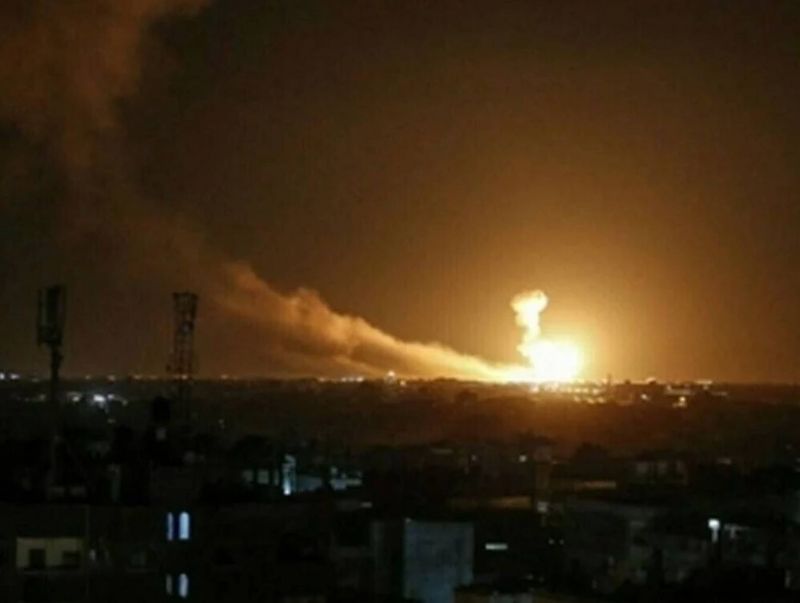
Israel carries out strikes near Damascus early Friday. (Credit: AFP)
Saudi Arabia’s Foreign Minister Prince Faisal bin Farhan is expected to deliver an invitation for the 32nd Arab League summit, scheduled for May in Riyadh, to Syrian President Bashar al-Assad, in a symbolic move formally ending more than a decade of regional isolation, sources told Reuters on Friday. On Saturday, a Syrian foreign minister visited Egypt for the first time since Syria’s diplomatic ties were strained in 2011 by a brutal crackdown on protests, which has since escalated to a protracted civil war causing hundreds of thousands of deaths. An Egyptian security source told Reuters the visit addressed steps towards restoring ties, which include Syria’s cooperation on border security and drug trafficking, according to another source. Last month, in the wake of Saudi-Iranian rapprochement and a visit by the Syrian president to the United Arab Emirates, sources told Reuters that Saudi Arabia and Syria intend to reopen embassies in each other’s territories. The 2022 Arab League summit host state, Algeria, unsuccessfully attempted to raise the issue of Syria’s re-admission, amid a lack of consensus from other member states. “There is a consensus building in the Arab world, that the status quo [on Syria’s isolation] is not tenable,” Farhan told Reuters last month, seeing an opportunity to “move beyond” it.
Israel launched three airstrikes against Syria between Thursday and Sunday, killing two members of Iran’s Revolutionary Guard. Two strikes targeted Damascus and one hit Homs, wounding at least seven people, while IRGC issued a statement saying the deaths of its two members would not go “unanswered” Britain-based war monitor, the Syrian Observatory for Human Rights, said Israeli missile attacks target pro-Iranian positions in Syria, adding that March was a month of particularly intense air strikes — including repeated attacks on the Aleppo airport which reportedly hit munitions depots. “The Iranians are extending their outreach to [the West Bank] and Gaza, and are attempting to entrench themselves in Syria and Lebanon,” Israeli Defense Minister Yoav Gallant said after a visit to the occupied West Bank. Syria denies the extent of the Iranian military presence claimed by Israel and Western countries.
An Israeli court indicted two settlers allegedly involved in a rampage last month against the occupied West Bank village of Huwara. The two suspects are accused of severe “acts of terror” during a March 6 retaliatory rampage on a town where two Israeli brothers had been killed. The rampage caused at least one death, hundreds of injuries and damage to dozens of homes, cars and livestock. The Palestinian Red Crescent Society at the time linked many of the injuries to the inhalation of tear gas reportedly fired by the Israeli military, despite later disavowals of the violence by Israeli officials and the arrest of 10 alleged raiders. The killing of the two brothers and the ensuing rampage came amid talks between Israeli and Palestinian officials aiming to de-escalate violence in what has been called the deadliest year for Palestinians in over a decade. Weeks of heightened tensions followed in the occupied West Bank amid streaks of attacks. US Secretary of State Anthony Blinken, while ensuring his country’s support for Israel, warned against inflaming “tensions.” Meanwhile, the Human Rights Watch condemned the Israeli government’s planned judicial overhaul, which is currently postponed after widespread protests. US president Joe Biden on Tuesday also criticized the Israeli government’s adamance to pass the controversial reforms.
The International Labor Organization (ILO) and the Food and Agriculture Organization (FAO) released new estimates of the impact on labor and food production caused by the devastating Feb. 6 earthquake, which killed more than 55,000 people in Turkey and Syria. The ILO estimated that 657,000 people had lost their jobs in affected areas in Turkey and 170,000 had lost their work in Syria. Meanwhile, the FAO estimated that over one-fifth of Turkey’s agricultural production has been hit by the earthquake, adding that more than one-third of the population in the hardest-hit areas relied on agriculture to survive. The UN agency appealed for more than $100 million in funding to support farmers and crop production ahead of an approaching planting season deadline. FAO Assistant Director-General and Regional Representative for the Near East and North Africa, Abdulhakim Elwaer, warned that crisis-hit food supply chains brought on unprecedented challenges to end hunger, calling for a conversion to inclusive, sustainable and resilient food and agriculture systems in the region.
Compiled by Abbas Mahfouz